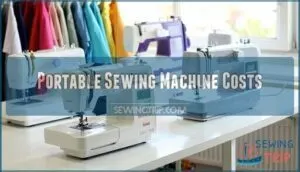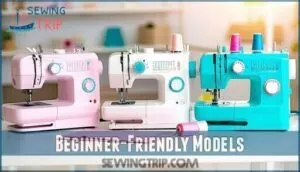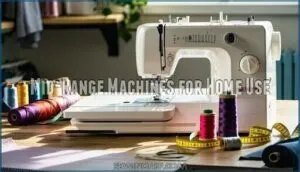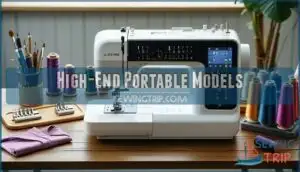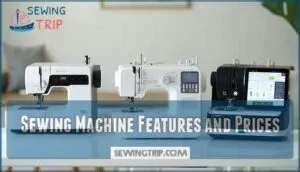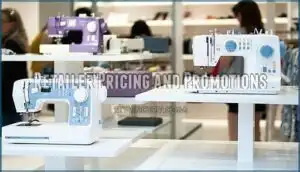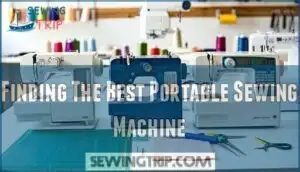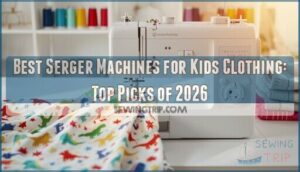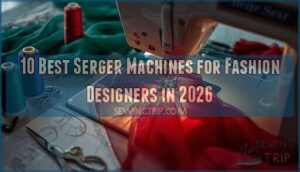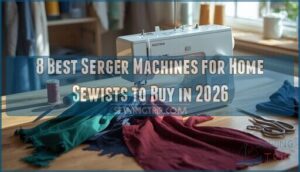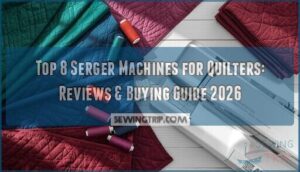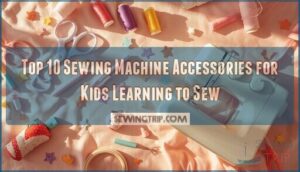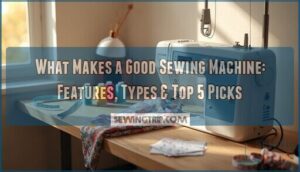This site is supported by our readers. We may earn a commission, at no cost to you, if you purchase through links.
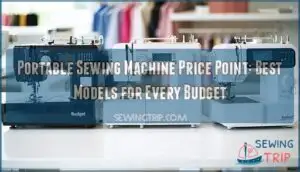
Entry-level models like Singer Start or Brother XM2701 offer basic functionality for beginners.
Mid-range options include computerized features with automatic threading and multiple stitch options.
Premium portable machines pack professional-grade capabilities into compact frames.
The portable sewing machine price point you choose should match your sewing frequency and project complexity.
Weight, durability, and included accessories also affect cost.
The perfect balance between features and affordability isn’t always found in the most expensive model.
Table Of Contents
Key Takeaways
- You’ll find portable sewing machines across three main price points: budget options ($50-$150), mid-range ($150-$300), and premium machines ($300-$500+), with each tier offering different features and capabilities to match your specific needs.
- When comparing models, you should consider both the upfront cost and value-adding features like computerized controls, built-in stitches, and included accessories, as these significantly impact both price and functionality.
- Don’t overlook retailer differences—online stores typically offer competitive pricing while specialty shops charge 10-20% more but provide expert guidance and service guarantees that may justify the premium.
- Your ideal machine balances essential functions with budget constraints, so focus on matching features to your actual sewing needs rather than paying for capabilities you’ll never use.
Portable Sewing Machine Costs
In regards to portable sewing machine costs, you’ll find plenty of options to fit any budget, from basic mini models under $20 to advanced designs over $1,000.
Understanding how features like quilting capabilities, computerized settings, or included accessories impact price can help you make the best choice, considering factors like computerized settings.
Free Shipping Policies
When shopping for a portable sewing machine, it helps to know the shipping policy.
Free shipping usually applies to orders over $49 but excludes delivery zones like Hawaii and Alaska.
Heavy items and assembled machines aren’t eligible, and subscription perks may sweeten the deal, but always check exclusions to verify your sewing machine price aligns with the desired price point.
Price Ranges for Various Models
Portable sewing machine prices vary widely based on brand and features.
Entry-level pricing starts around $10 for mini sewing machines, while mid-range costs range from $100 to $300 for home use.
High-end prices can exceed $1,000, with brand price points like Janome, Brother, and Singer offering affordable sewing machine options.
Feature price impact includes extras like LED lights or quilting tools.
Factors Affecting Machine Prices
Materials, brand influence, and manufacturing locations play big roles in what you pay for a sewing machine.
Materials, brand reputation, and production origins shape the value and pricing of your perfect portable sewing machine.
Feature complexity—like built-in stitches or USB ports—drives up sewing machine costs.
Retailer markups, too, impact affordability.
Understanding the importance of a free arm feature can also influence the price due to its utility for sewing cuffs and sleeves.
Whether you’re eyeing a cheap sewing machine or evaluating a mini sewing machine price, understanding these factors guarantees finding an affordable sewing machine that balances quality and price.
Sewing Machine Price Comparison
Comparing sewing machine prices can feel like untangling threads, but it’s simpler with the right perspective.
Consider brand price points, feature cost analysis, and retailer price wars to find value. A portable sewing machine ranges from $10 to over $15,000, while mini sewing machine prices often hover below $50.
Used machine values depend on model condition, though repairs may raise overall costs. High-end models typically include quilting or computerized features, adding $50-$300 to the sewing machine cost.
Metal frames offer enhanced long-term durability compared to plastic alternatives.
Here’s a quick price comparison:
| Brand | Price Range | Features Included |
|---|---|---|
| Singer | $21 – $159.99 | Basic to mid-range functions |
| Juki | Starting at $449.75 | Advanced, durable options |
| VEVOR | Under $50 | Mini, portable designs |
| Brother | Around $240 | Moderate, user-friendly models |
| Janome | $199 – $249 | Bonus accessories included |
Understanding pricing helps you sew smarter!
Affordable Sewing Machine Options
You’ll find quality entry-level sewing machines from trusted brands like Singer and VEVOR starting at just $20.
These machines offer great value, with mid-range options between $100-$300 providing essential features like built-in stitches and LED lighting.
These budget-friendly models provide the core functionality you need without the premium price tag of computerized systems, making them perfect for beginners and casual sewists with limited space, offering a great way to get started with basic sewing.
Beginner-Friendly Models
While price comparisons help narrow options, finding the right beginner sewing machine comes down to features that make learning easier.
For new sewists on a budget, consider these beginner-friendly portable models:
- Singer mechanical machines start at just $40 with simple stitches
- Magicfly portable machines under $50 include finger guards for safety
- Brother XM2701 at $100 offers easy threading and speed control
These lightweight designs provide basic features without overwhelming you. You can also find a suitable beginner sewing machine online.
Mid-Range Machines for Home Use
While beginners have their starter options, mid-range machines for home use typically fall between $100-$300, offering the perfect balance of functionality and affordability.
You’ll find reliable workhorses like the Brother CS7000X ($240) that won’t break the bank but deliver impressive stitch options and durability expectations.
Brand comparisons show Singer models range from $21-$159.99, while value assessment reveals these machines excel at both everyday repairs and creative home decor projects.
Many users find a quality machine selection in this price range.
High-End Portable Models
While high-end portable sewing machines command prices from $649 to over $1,000, they justify their investment through advanced capabilities and luxury features.
Models like the Janome Memory Craft Horizon 8200 ($999) and Juki TL2010Q offer sophisticated enhancements including thread cutters, memory functions, and telescoping thread stands.
Top brands like Bernina and Janome deliver impeccable stitch quality, enhanced durability, and extensive accessory packages that serious sewists value.
Sewing Machine Features and Prices
You’ll find that sewing machine prices directly correlate with their technical capabilities, with features like computerized controls, LED lighting, and stitch variety substantially impacting cost.
Machines range from $10 entry-level models with basic functionality to premium options exceeding $1,000 that offer advanced capabilities like extensive built-in stitches, USB connectivity, and specialized quilting functions.
The price range indicates a significant difference in the computerized controls and other features available in each model.
Computerized Vs Mechanical Machines
Now that you’ve explored budget-friendly options, you’ll want to understand what’s under the hood.
Mechanical and computerized portable sewing machines differ substantially in both price and functionality.
- Repair Difficulty – Mechanical machines are easier to fix and maintain yourself
- Long-Term Investment – Manual machines can last decades without electronic failures
- Beginner Friendliness – Computerized models prevent common mistakes automatically
- Feature Convenience – Digital machines offer more stitches at higher price points
- Durability Simplicity – Mechanical mini sewing machines withstand rough handling better
Additional Features and Accessories
While mechanical machines offer simplicity, your sewing machine’s true value lies in the accessories that accompany it.
For portable machines, these add-ons substantially enhance functionality without compromising portability.
Let’s examine what to look for: Many users find an auto needle threader helpful for quick setup.
| Feature | Benefit |
|---|---|
| Auto Needle Threaders | Saves time and eye strain |
| Extension Tables | Expands workspace for larger projects |
| Multiple Presser Feet | Handles various fabric types and techniques |
| Built-in LED Lighting | Improves visibility in all conditions |
| Drop-in Bobbin Systems | Simplifies bobbin placement and monitoring |
Impact of Features on Machine Cost
Now that you’ve seen which accessories come with your machine, let’s look at what drives the price tag.
Each feature adds to your portable sewing machine’s cost.
LED lighting typically adds $20-$40, while quilting capabilities can bump prices by $100+.
Computerization carries a $50-$100 premium over mechanical models.
Stitch variety costs more as numbers increase.
Battery-powered options command a $20-$30 premium.
Understanding these cost factors helps you find an affordable sewing machine that matches your needs.
Retailer Pricing and Promotions
You’ll find significant price differences between retailers when shopping for portable sewing machines, with online stores like Amazon offering competitive pricing while specialty shops charge 10-20% more but provide expert guidance.
Expert guidance at specialty shops may cost more, but it ensures you get tailored advice and exclusive sewing machine options.
Many retailers now offer interest-free payment plans that let you spread the cost over four equal payments, making even premium models more accessible without additional fees.
Online Retailers and Price Matching
When searching for your perfect portable sewing machine, major online retailers offer compelling options.
Amazon’s pricing spans from budget-friendly $10 models to extensive $500 machines.
Walmart’s alignment with Amazon prices gives you reliable alternatives, while eBay trends show machines hovering around $450.
Many retailers match competitors’ prices, but policies vary substantially, with price matching available at Best Buy, Target, and Bed Bath & Beyond, requiring proof of lower pricing, while Amazon and Costco don’t match at all, highlighting the importance of reliable alternatives and understanding competitors’ prices.
Specialty Retailers and Premium Prices
While online retailers often compete on price, specialty sewing shops take a different approach.
You’ll pay a 10-20% premium at these niche marketplaces, but you’re getting more than just a machine.
Expert advice, exclusive models, and service guarantees often justify the higher-end sewing machine costs.
Many specialty retailers offer loyalty programs that provide long-term value, especially when investing in premium or luxury machines within the broader sewing machine price range.
For example, purchasing from an authorized dealer can guarantee you receive the full warranty coverage details.
Interest-Free Installment Plans
While specialty retailers may charge premium prices, you’ll find flexible payment options available across all price points.
Interest-free installment plans let you spread payments without extra fees. Most retailers offer 4-payment plans on machines from $10 to $500, with simple eligibility criteria and straightforward payment schedules.
Credit requirements are typically minimal, with retailer participation widespread. These sewing machine financing options make quality equipment accessible even when you’re watching your budget, providing interest-free and straightforward ways to purchase.
Finding The Best Portable Sewing Machine
You’ll find the ideal portable sewing machine by matching your specific requirements with features available across various price points from $10 to $1,000+.
Your perfect machine balances essential functions like stitch variety, weight, and durability with your budget constraints while considering how and where you’ll use it most frequently, which involves finding a balance between these factors and your budget constraints.
Considering Budget and Needs
After exploring retailer offers, it’s time to match your wallet to your needs.
Your sewing goals should drive budget prioritization—don’t overspend on features you’ll never use. Consider your skill level and usage frequency when selecting a price point.
Beginners might find budget-friendly options under $100 perfectly adequate, while frequent sewers benefit from investing in value-priced machines.
Remember space constraints too—portable models fit nicely in smaller homes while delivering impressive performance for their size.
Consider a reputable brand sewing machine like Brother or Janome for enhanced quality.
Researching and Comparing Models
After setting your budget, it’s time to roll up your sleeves and compare models systematically.
Smart research prevents buyer’s remorse when selecting a portable sewing machine.
- Check Model Specifications for stitch count and capabilities
- Look for Feature Overlap to avoid paying for unnecessary functions
- Consider Brand Reputation for reliability (Janome and Brother consistently rate highly)
- Read User Reviews from actual sewists
- Verify Warranty Coverage before purchasing
Frequently Asked Questions (FAQs)
What is a 2 needle sewing machine?
Like a synchronized dance team, a 2-needle sewing machine features dual needles working simultaneously to create parallel stitches.
You’ll use it for decorative topstitching, hemming, or creating perfectly even seams on your projects.
What is a good travel sewing machine?
For a good travel sewing machine, consider the Janome 2212 or MOD-
You’ll want something lightweight with essential features.
Look for models under 10 pounds that include free arm capability and built-in stitches.
What is the best affordable sewing machine?
You’ll find the Brother CS7000X at $240 offers excellent value with built-in stitches and LED lighting.
For tighter budgets, Singer models ($21-$160) or VEVOR machines (under $50) provide reliable functionality for beginners.
Are extended warranties worth the cost?
Warranties warrant watchful wisdom when weighing worth.
You’re often better off saving that money instead, as most machines show problems during the standard warranty period.
Only consider extensions for high-end investments.
How often do portable machines need servicing?
Most portable sewing machines need professional servicing every 12-18 months, depending on usage frequency. You’ll extend your machine’s lifespan with regular maintenance, which typically costs between $80-150 per service appointment.
Do portable machines hold resale value?
Like a fine wine, portable sewing machines typically maintain 40-60% of their value.
You’ll see better returns on quality brands like Janome, especially with proper maintenance and if you’ve kept original accessories and packaging.
Are refurbished portable machines reliable?
You’ll generally find refurbished portable machines quite reliable as they’re triple-checked for quality before shipping.
Most come with 6-12 month warranties and offer like-new performance at lower prices—just verify the refurbisher’s reputation first.
Can portable machines handle professional workloads?
Most portable sewing machines can handle light professional work, but they’re not built for continuous, heavy-duty projects. You’ll need a sturdier model with metal components for intensive commercial use.
Conclusion
Finding your ideal portable sewing machine price point doesn’t require endless searching or budget-breaking decisions.
Whether you’re investing $80 in a basic beginner model or $400 in a feature-rich computerized machine, remember that functionality matters more than price tag alone.
Consider your project needs, sewing frequency, and skill level before purchasing.
You’ll discover that the perfect portable sewing machine price point balances quality, features, and affordability—creating the foundation for your creative journey.

